Peace and Nonviolence
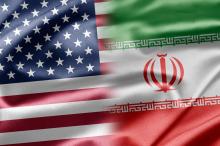
AT LAST, AFTER more than 30 years of isolation since the Islamic Revolution of 1979 overthrew the U.S.-installed Shah, American and Iranian officials are talking to each other. The late September telephone conversation between President Obama and Iranian President Rouhani was an important first step. If the two sides can reach an agreement on ending the nuclear standoff, it could pave the way for other forms of cooperation that could significantly improve regional and global security.
Because of the historical mistrust between the United States and Iran that goes at least as far back as the 1954 CIA-backed coup that overthrew Iran’s democratically elected prime minister, achieving progress will require diplomatic flexibility on both sides. The core objectives of the international community are to prevent Iran from developing nuclear weapons and to guarantee that its nuclear program is solely for peaceful purposes. This can be accomplished by convincing Tehran to accept binding limits on its nuclear program and by robust monitoring mechanisms to guarantee the absence of military-related activities.
Iran’s objectives are to gain international acceptance of its right to develop nuclear energy, including uranium enrichment, and to obtain relief from crippling sanctions. If Tehran takes steps toward accepting limits and agreeing to enhanced transparency and monitoring, Washington should offer an initial partial suspension of sanctions and pledge to lift additional sanctions as progress proceeds. This would help jump-start the talks and strengthen President Rouhani’s hand in the face of hardliners.
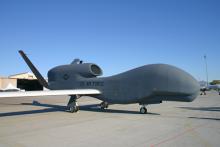
Is the U.S. scapegoating Al Qaeda? It’s an odd question, I know, but it reared its ugly head as I read about the new reports from Amnesty International and Humans Rights Watch on U.S. drone strikes. The scapegoating mechanism is a very precise instrument that accrues enormous benefits to the scapegoater. By accusing their scapegoat of wrongdoing, a scapegoater ingeniously hides from the reality of their own guilt. Now here’s the weird thing: a scapegoat does not have to be innocent to function as a scapegoat. Scapegoats can be evil, nasty, ruthless, amoral sons-of-bitches and still function perfectly well as a scapegoat. Which is why I ask the question: Is the U.S. scapegoating Al Qaeda to hide from its own guilt?
With that in mind, I invite you to read these few excerpts that raised the question for me, with key phrases in boldface:
[continued at jump]

What do you do with critical information on intractable justice issues when reputation, methods, or prevailing propaganda make it difficult for people to believe the truth? How does one find ways to strengthen the fragile line between democracy and the lurking dark social disorder? Limiting or reversing anarchy in the U.S. and abroad may depend on finding ways to persuade and protect the common good.
A current question is in regard to the 20-year Oslo peace process (which was to be completed with separate States after 5 years). When it failed, its successor peace plans promised to bring flourishing democracy and a just peace that would hold back the winds of war and be good for Israelis as well as Palestinians.
The strategy of negotiations with prolonged periods of stalling has only widened the occupation and allowed Israel to strengthen its hold on Palestinian property. It has been conquest by a 1,000 cuts on people (1,500 Israelis and 15,000 Palestinians dead), as well as uprooted trees and bulldozed property. Less than 10 percent of 1967 war land area of Palestine is fully controlled by the Palestinian Authority. It is as though a volcanic cloud blocks the sun. Even with Secretary of State John Kerry’s vigorous efforts to diminish the rumblings and forestall an eruption, those who assure us there are signs of hope declare time is growing mercilessly short.

The couple practiced Candomble, an African-Brazilian faith with roots in Brazil’s slave trade.
They dressed in white and believed in an all-powerful God who is served by lesser deities, blending Catholicism with African spiritualism, or the belief that the dead communicate with the living.
But their neighbor, who attended a local evangelical church, disapproved. On a balmy day one year ago he shot and killed the husband as he was screwing in a light bulb in his yard.
GEORGE MITCHELL, the former U.S. senator who famously brokered peace in Northern Ireland, knows the path to peace is unpredictable. “Until it happens,” he said, “you can’t predict with certainty. ... You can’t take ‘no’ for an answer. ... You just have to keep at it until peace is achieved.”
After five years of stalled Middle East peace talks, Secretary of State John Kerry lured Israeli and Palestinian negotiators back to the peace table in July. Sadly, my desk is littered with articles by naysayers who seem more than willing to “take ‘no’ for an answer” when it comes to peace in the Holy Land.
Naysayers point to the expansion of Jewish settlements and the political power of Israeli hawks, as well as the divisions in Palestinian society that convince them there is “no true partner for peace.” Certainly years of disappointments and failed negotiations offer ample cause for skepticism.
But I agree with Faisal Abbas, who suggests that cynicism is a lazy option we can’t afford. “Negotiations may succeed or fail to achieve peace,” he writes, “but the alternative (not having these negotiations) is guaranteed to fail.”
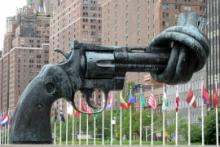
IN 1988, a bronze sculpture of Carl Fredrik Reuterswärd’s knotted gun was placed outside the United Nations headquarters in New York. As Kofi Annan, former U.N. secretary general and Nobel Peace laureate, remarked at its unveiling, the sculpture isn’t just a cherished piece of art, but a powerful symbol that encapsulates in a few simple curves the greatest prayer of humanity: not for victory, but for peace.
Inside the U.N. building is a mosaic representing all the nations of the Earth, accompanied by Jesus’ words, “Do unto others what you would have others do unto you.” For many seasoned peace campaigners, myself included, this prayer was partly answered when the 193-nation U.N. General Assembly overwhelmingly approved the Arms Trade Treaty in April.
The treaty seeks to regulate the international trade in conventional arms, from small arms to tanks, combat aircraft, and warships. It aims to foster peace and security by putting a stop to the destabilizing flow of arms to conflict regions. This process cannot, however, be only a matter of negotiation and numbers. What needs to undergird the treaty is protecting humans, made in God’s image. What needs to motivate the treaty is ensuring the possibility of what philosopher Hans Jonas called “the permanence of an authentically human life on Earth.”
The statistics are frightening. Globally, one person dies every minute from armed violence. This treaty will help halt the uncontrolled flow of arms and ammunition that fuels wars, atrocities, and rights abuses. The devastating humanitarian consequences of the two-year war in Syria, a war fueled in part by the irresponsible export of arms, underline just how urgently this treaty is needed.

IN EARLY SEPTEMBER, President Obama told the American people that the use of chemical weapons by Bashar al-Assad of Syria was a moral atrocity that required international consequences.
Religious leaders agree with the necessity of a determined response to the Assad regime, which is responsible for the deaths of 100,000 of his own people, including the brutal use of chemical weapons on civilians. But many faith leaders are asking tough moral questions about what that response should look like.
We fundamentally reject the assumption that refraining from military action is “doing nothing.” We need more imagination and a deeper response than the traditional one of military strikes, which haven’t proven effective and almost always have serious unintended consequences, risk dangerous escalations, and consistently create more suffering for innocent civilians.
As religious leaders, we are called to peacemaking, not just peace loving, which requires harder and more imaginative work than merely falling into old habits of military “solutions.” Our priorities should be to mobilize global support for the many vulnerable Syrians—including the millions of refugees—and to do the hard work of conflict resolution that could lead to a political solution.

The U.S. has resisted this peacemaking policy for generations. Even as far back as 1792, a signer of the Declaration of Independence, Benjamin Rush, along with Benjamin Banneker, suggested the blueprint for an Office of Peace (intended to counter what was then known as the Department of War). President George Washington stated that his first wish was “to see this plague of mankind, war, banished from the earth,” yet legislation for a Department of Peace was not introduced until 1935, which, by 1969 wasfollowed by 90 additional bills. And so, while many U.S. citizens state a longing for peace and nonviolence, we seem to lack the political will and public motivation to make it a reality, and the result is a continued state of destruction.
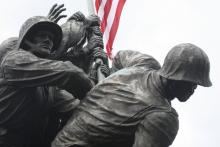
I wish that we, as a people, would speak better words to those who have served in our wars. I fear that we do them, and ourselves, a disservice when we call them all heroes without letting them decide which deeds were heroic and which should be left unspoken. When we call everyone who wears a uniform a hero, we diminish heroism everywhere.
I don’t mean we should refrain from thanking those who serve. If anything, we should thank them far more than we do, and our thanks should not just be in words. Our thanks should be sincere and long-lasting, and expressed in things like the best military hospitals we can afford, the best education we can provide, and our best efforts to ensure that their generation will be the last to endure what they have endured. Even if those ideals prove to be unattainable, we should not let that stop us from trying to attain them. As the Talmud says, “It is not your job to finish the work, but you are not free to walk away from it.”

The deadly mall attack in Kenya on Saturday is a sign that the al-Qaida-affiliated group that carried it out has been dealt a blow in Somalia and they are looking to generate headlines with more high-profile attacks in the region, a regional expert says.
The militant group that carried out the attack, al-Shabab, wants to establish an Islamist government in Somalia.
In recent years, however, African Union troops in Somalia have driven the militants out of most parts of the capital city of Mogadishu as a U.S.-supported government there has attempted to establish control over the country. At one time, al-Shabab controlled parts of Mogadishu.
The attack in Nairobi underscores al-Shabab’s organizational skills and their commitment to die for a cause, said David Shinn, a former U.S. ambassador to Ethiopia and a professor at George Washington University.
But it also highlights that the group has to rely on high-profile terrorist attacks that generate headlines because they lack popular support and have failed in any direct fights with African Union forces in Somalia.
“Increasingly, al-Shabab has alienated the average Somali,” Shinn said.

Any right-thinking stranger on our shores must read our daily news and think our nation has gone mad. We have cultivated the ability to end lives quickly; and yet we are continually surprised when our fellow citizens use the tools we have devised for exactly the purpose for which we invented them. Come to think of it, I think we’ve gone mad, too.
But our madness is not one that can be cured by laws alone. Laws can help to restrain us, and can help by making it a little less easy for us to find ourselves armed for murder. But we need something more, something that churches are better equipped to offer than legislatures are.
What we need right now is a richer moral imagination. We need better stories to tell ourselves, stories about the kind of people we could be. We need, more than anything, to learn to help one another to do the hard work of choosing not to pull the trigger.

The reality is bleak: 33 Americans are killed and 260 wounded from gun violence daily. Yesterday, as the culmination of its No More Names bus tour, which reached 25 states in 100 days, Mayors Against Illegal Guns rallied at the Capitol to urge Congress to pass a bill enforcing mandatory background checks for potential gun owners.
Spearheaded in 2006 by Boston Mayor Thomas Menino and New York Mayor Michael Bloomberg, MAIG began with 15 mayors, and has since grown to more than 1,000. The group’s goal is to make American communities safer by reducing the number of illegally obtained guns and by holding dealers accountable for potential gun-purchasers.
At the Hill gathering, representatives from myriad groups came together to advocate for stricter background checks and to push Congress out of their inaction. Tuesday, the Senate postponed a hearing on the legality of “Stand Your Ground” laws — on the heels of Monday’s Navy Yard gun violence.
Congressional representatives, mayors, police officers, military veterans, NRA members, women’s organizations, advocacy groups such as Mothers Demanding Action, faith community leaders (rabbis, priests, and pastors), university groups, children, gun violence survivors, and family members of those who have lost someone to gun violence were all in attendance at the No More Names rally. A broad coalition: racially, socioeconomically, and generationally diverse, as indiscriminant as the bullets that affect us all.

On May 23, President Obama gave a major address from the National Defense University, in which he personally acknowledged for the first time the U.S. government’s killing of four Americans — along with scores of others — under its program of assassination by remotely controlled drones. I was able to watch this televised speech from the privileged vantage of a federal prison on the last day of a sentence resulting from my protest of drones operated from Whiteman Air Force Base in Missouri.
Over the previous six months in the Federal Prison Camp at Yankton, S.D., I had watched from afar as the discussion on drone warfare emerged from the fringe and into the mainstream. Fellow prisoners brought me clippings on the subject from their local newspapers and kept me apprised of what they heard on the evening news. The American people seemed to be just awakening to the reality and consequences of wars being fought and assassinations carried out by unmanned but heavily armed planes controlled by combatants sitting at computer screens at stateside bases far from the conflict.
I was there with the NGO Justice for Colombia to hear about the country's 'false positives' scandal, which first broke five years ago and shows no sign of relenting any time soon. The scandal has its roots in the Colombian 50-year civil war between the government and the left-wing peasant insurgent group FARC. In the early 2000s, then-president Alvaro Uribe, out of an apparent concern for the army’s reputation, started putting pressure on soldiers to increase their kill figures.According to media reports, soldiers were promised cash payments and more vacation time if they produced the bodies of dead FARC guerrillas—an accusation the government denies. In an effort to increase their quotas, soldiers allegedly started luring young, impoverished men away from their homes with the offer of work. Once away from their families, the soldiers executed the men, dressed them up in guerrilla uniforms, and presented them as combat kills. Many victims were dismembered and buried hundreds of miles away from their families.
Read more.

Two weeks ago, it seemed that any minute the United States would begin bombing Syria. On Aug. 27, NBC’s top headline ran: “Military Strikes on Syria ‘as Early as Thursday,’ U.S. officials say.”
So our Quaker lobby did what all of us peace and security groups do when our country’s decision makers decide to bomb another country and we have long odds and little hope of success from stopping them: we flooded our network — including many of the inboxes of readers of this blog — with pleas to join us in writing, calling, and lobbying members of Congress and the Obama administration to stop this new war.
The pressure worked to postpone U.S. war plans. The groundswell of grassroots opposition to this war persuaded President Obama to go to Congress before launching Tomahawk cruise missiles into Damascus. A vote was expected in days, and then it was delayed, as an unprecedented outpouring of public opposition from Americans of every political stripe pushed Congress to pursue alternatives to military force.

As President Barack Obama prepared to address the nation on Tuesday evening to articulate a plan for intervention in Syria, NBC rushed to assure its viewers that the Ryan Seacrest-hosted game show, The Million Second Quiz, would not be interrupted. As detailed by the network, the president would speak for only 15 minutes, thus viewers could watch their televisions with full confidence that the entirety of the hyped-up program would be fully protected. While there was suspense as to whether NBC would follow through on its promise of an unbroken telecast, the presidential coverage stayed within the agreed upon time slot, viewers were able to watch their regularly scheduled program, and all was well in the world.
In the meantime, all is not well in the world.

It’s been five years now that Talat Hamdani has been able to talk about her son without crying, but she still prefers mostly not to tell his story.
“It’s all over the Internet,” she said.
She’s stopped talking about how she initially didn’t worry when her son, Mohammad Salman Hamdani, who was a cadet with the New York City Police Department, didn’t answer his cellphone that night; about how police questioned her and her husband when authorities couldn’t find their son’s body, to see if he had any terrorist connections; about the New York Post headline a month after the attacks — “Missing – Or Hiding? – Mystery Of NYPD Cadet From Pakistan,” that cast him as a suspect in the 9/11 attacks.
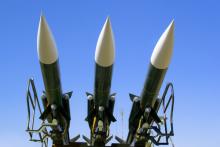
There’s a catch phrase that comes to the fore when people start looking for religious reasons not to enter a war like the one now raging in Syria: “Who would Jesus bomb?”
Jesus would not have bombed anyone, of course. Bombs were not weapons of choice in his day. But the cruelty of war was no stranger to his era. The Romans could be every bit as cruel as Syria’s Bashar al-Assad. They executed dissidents like Jesus himself with ease. They leveled the city of Jerusalem.
But if it is hard to imagine Jesus targeting a cruise missile aimed at another nation, it is not hard to imaging him encouraging his followers to stand with those who are most vulnerable, to seek ways to defend others from cruelty, to come to the aid of those refugees displaced by war. The question is how best to do that.

Right after 9/11, I asked a kid in my neighborhood what we should do in response. His answer: “Those people did something very wrong ...” He thought pensively and continued, “But two wrongs don’t make a right.”
As Martin Luther King taught us, you cannot fight fire with fire, you only get a bigger fire. You fight fire with water. You fight violence with nonviolence. You fight hatred with love.
As a Christian, a follower of Jesus the Prince of Peace, I am deeply troubled about the possibility of a military response to the violence in Syria. Jesus consistently teaches us another way to respond to evil, a third way – neither fight nor flight. He teaches that evil can be opposed without being mirrored, oppressors resisted without being emulated, enemies neutralized without being destroyed.
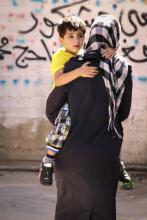
I have read countless articles from political, religious, and ethical perspectives on why or why not the U.S. should militarily intervene against the Syrian regime. Most do a decent job evaluating the situation, but I have yet to read one that really puts the human element on the table as a deciding factor.
A few months ago I was going to bed in my hotel room in Tel Aviv when I saw the breaking news alert that there was rocket exchange between Hamas and Israel in and around Gaza. While I have been to many places in "conflict," there is something much different about being somewhere that is only miles away from live fire.
I started playing out the situation in my head: "What if this expands into a major conflict? Can I catch a flight back home to be with my family before it gets worse? I'm only 30-40 miles away from the active conflict, am I already in range sitting in this hotel room?"
Anxiety. Fear. Uncertainty.
Now let me be clear, that experience of anxiety and fear is NOTHING compared to what most Israeli's, Palestinians, Egyptians, or Syrian's have felt in recent years (and MANY other populations). But — even if only in some small way — I could immediately feel the weight of pending war. It is palpable. It is crippling. And if I had my family with me, it would have potentially been unbearable.